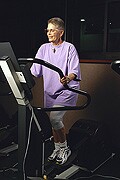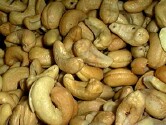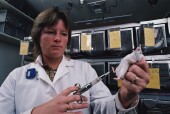| 
Exercise May Help Prevent Age-Related Memory Loss
 TUESDAY, Sept. 2 (HealthDay News) -- Exercise may help treat memory problems in adults, according to new research from Australia.
The study, focused on 138 people age 50 and older at increased risk for dementia, found that a home-based physical activity program led to modest improvements in cognitive function in adults with memory difficulties.
The participants -- who had memory problems but didn't meet criteria for dementia -- were randomly assigned to do the 24-week home-based physical activity program or to receive usual care.
Those in the exercise group were encouraged to do at least 150 minutes of moderate-intensity physical activity per week in three 50-minute sessions. Walking was the most frequently recommended type of activity. Participants in the exercise group did an average of 142 minutes more physical activity per week, or 20 minutes more per day, than those in the usual care group.
Over 18 months, participants in the exercise group had better Alzheimer Disease Assessment Scale-Cognitive Subscale (ADAS-Cog) scores and delayed recall, and lower Clinical Dementia Rating scores, than those in the usual care group. The ADAS-Cog consists of a number of cognitive tests.
The findings were published in the Sept. 3 issue of the Journal of the American Medical Association.
"To our knowledge, this trial is the first to demonstrate that exercise improves cognitive function in older adults with subjective and objective mild cognitive impairment. The benefits of physical activity were apparent after six months and persisted for at least another 12 months after the intervention had been discontinued. The average improvement of 0.69 points on the ADAS-Cog score compared with the usual care group at 18 months is small but potentially important when one considers the relatively modest amount of physical activity undertaken by participants in the study," wrote Dr. Nicola T. Lautenschlager, of the University of Melbourne, and colleagues.
"Unlike medication, which was found to have no significant effect on mild cognitive impairment at 36 months, physical activity has the advantage of health benefits that are not confined to cognitive function alone, as suggested by findings on depression, quality of life, falls, cardiovascular function, and disability," the researchers added.
They noted that the number of older adults with Alzheimer's disease (AD) could increase from the current 26.6 million to 106.2 million by 2050. If AD onset could be delayed by 12 months, there would be 9.2 million fewer cases of AD worldwide.
Exercise and other lifestyle factors may benefit older adults at risk for Alzheimer's disease, Dr. Eric B. Larson, of the Group Health Center for Health Studies in Seattle, wrote in an accompanying editorial in the journal.
"Health advances of the past century have led to more individuals surviving to extreme old age, when their risk of Alzheimer disease and related dementias increases substantially," Larson added. "Exercise -- and possibly other lifestyle factors -- appears to affect vascular risk and late-life brain health."
More information
The National Institute on Aging has more about memory loss  . .
|  |

Nuts, Seeds, Popcorn Don't Boost Diverticulosis Risk
 TUESDAY, Aug. 26 (HealthDay News) -- People with diverticular disease, a common digestive disorder, are typically told to avoid eating popcorn, nuts, seeds and corn so they don't get painful attacks.
But, a new study calls into question that conventional wisdom. The study of more than 47,000 men found that eating those foods did not seem to increase the risk of diverticulosis or diverticular complications.
"We found, contrary to current recommendations, that actually, consumption of these foods did not increase the risk of diverticulitis or diverticular bleeding and didn't appear to increase the risk of developing diverticulosis or its complications," said study lead author Dr. Lisa Strate, an assistant professor of medicine at the University of Washington School of Medicine, in Seattle.
The findings are published in the Aug. 27 issue of the Journal of the American Medical Association.
Diverticular disease affects the colon, the part of the large intestine that discards waste. Diverticulosis occurs when pouches -- called diverticula -- form in the colon. Stool or bacteria can lodge in the pouches. Diverticulitis occurs when the pouches get inflamed; symptoms can include bleeding, infection or a blockage of the digestive system.
One third of U.S. adults have diverticulosis by age 60, although most do not experience serious problems. By age 85, two-thirds of people have come down with the condition, according to the U.S. National Institutes of Health.
The exact cause isn't known, although many experts blame a low-fiber diet. Muscle strain during defecation may cause the pouches to form.
The advice to avoid nuts, seeds, popcorn and corn comes from the belief that these foods may be more likely to become lodged within the pouches. But there's been no proof demonstrating such a link.
And Strate's study failed to find a link, either. Evaluating data from the long-running Health Professionals Follow-up Study, a cohort of men followed from 1986 to 2004, she and her colleagues looked at medical records every two years and dietary information for every four years. The men ranged in age from 40 to 75.
At the study start, all were free of diverticulosis or complications. Eighteen years later, 801 had experienced diverticulitis, and 383 had diverticular bleeding.
When the study authors compared men with the highest intake of foods such as nuts with those with the lowest, they found that those who ate the most nuts were actually 20 percent less likely to get diverticulitis than those who ate the least. And those men who ate the most popcorn were 28 percent less likely to get diverticulitis than those eating the least.
No association was found for corn.
Strate thinks the longstanding dietary recommendations should be reconsidered, but she cautioned that hers was just one study. She believes the findings would probably apply to women, too.
Dr. Anthony Starpoli, an attending gastroenterologist at Lenox Hill Hospital in New York City, who is familiar with the new findings, said that even though the study numbers were large, the results may not apply to everyone. "There are probably going to be a subset of people where perhaps a more restrictive diet does benefit them," he said.
Starpoli said that, while the recommendation to avoid nuts, popcorn and seeds isn't based on scientific studies, there are people who do experience distress when they eat those foods.
"If you are a patient with known diverticular disease, and you have had the experience of eating seeds, nuts and popcorn and developed diverticular pain as assessed by your doctor, you should probably not have those foods."
More information
To learn more about diverticular disease, visit U.S. National Digestive Diseases Information Clearinghouse.
|  |

More Juices Found to Affect Drugs' Effectiveness: Study
 TUESDAY, Aug. 19 (HealthDay News) -- Grapefruit juice, long known to boost the absorption of certain medications, isn't the only juice that doesn't mix well with drugs, according to the Canadian researcher who first identified the ill effects of grapefruit juice.
Other common juices, including orange and apple, may limit the body's absorption of drugs, compromising their effectiveness, said David Bailey, a professor of medicine and pharmacology at the University of Western Ontario, in London, Ontario, Canada.
Bailey was expected to present his research Tuesday at the American Chemical Society's national meeting, in Philadelphia.
"The original finding is that [grapefruit juice] markedly boosts the amount of drug that gets into the bloodstream," Bailey said. He first reported that nearly 20 years ago when he discovered that grapefruit juice increased the body's blood levels of the drop felodipine (Plendil), used to treat high blood pressure.
Since the original finding, other researchers have identified dozens of other medications that could interact adversely with grapefruit juice, Bailey said.
Doctors traditionally warn against drinking grapefruit juice if you're taking certain medications for high cholesterol, high blood pressure and heart rhythm problems, according to the American Academy of Family Physicians.
In his latest research, Bailey found that grapefruit juice, as well as orange and apple juice, can lower the body's absorption of some medications. Those drugs include the anti-cancer drugs etoposide (Etopophos, Vepesid); certain beta blockers like tenormin (Atenolol) and talinolol (Cordanum), used to treat high blood pressure and prevent heart attacks; cyclosporine, which is used to prevent organ transplant rejection; and some antibiotics, including ciprofloxacin (Cipro), levofloxacin (Levaquin), and itraconazole (Sporanox).
Bailey also found that healthy volunteers who took the allergy drug fexofenadine (Allegra) with grapefruit juice absorbed only half the amount of the drug, compared with volunteers who took the medicine with water.
In each case, substances in the juices affected the absorption of the drugs. Some chemicals block a drug uptake transporter, reducing drug absorption; other chemicals block a drug metabolizing enzyme that normally breaks down the drugs, he said.
"We don't [yet] know all the drugs affected," Bailey said.
Michael Gaunt is a medication safety analyst at the Institute for Safe Medication Practices in Horsham, Pa. He said, "If this study holds true [in future research], you are going to have to warn people in a similar fashion" about other juices.
Gaunt's advice for now: "In general, it's safest to take medication with water."
Bailey agreed. If you opt for water, he said, "a glass is better than a sip. It helps dissolve the tablet." And cool water is better than hot, he added, because your stomach empties cool water faster, sending the medication on its way to the small intestine and finally the blood stream.
More information
To learn more about juice and medication interactions, visit the American Academy of Family Physicians  . .
|  |

Vitamin C Shows Promise as Cancer Treatment
 TUESDAY, Aug. 5 (HealthDay News) -- New research with mice suggests that intravenous doses of vitamin C could one day reduce the size of cancerous tumors in people.
The findings are preliminary and still must be confirmed in humans. And even if the treatment works, it's not a cure but would likely be used in combination with other drugs, the researchers said.
Still, the research does show an unexpected use for vitamin C, which has previously been thought of as a nutrient, not a drug, said study co-author Dr. Mark Levine, chief of the U.S. National Institutes of Health's Molecular and Clinical Nutrition Section.
"There's potential promise that [vitamin C] is part of the armamentarium for treating some cancers," he said. "Which ones? We've got to do more and find out."
Vitamin C has long been one of the most respected of all vitamins, lauded for its supposed powers to treat many ills, from colds to heart disease. The late scientist Dr. Linus Pauling increased the vitamin's profile by touting it as a cancer treatment.
But getting heavy doses of vitamin C into the body is a challenge. Unlike some other vitamins, it's virtually impossible for people to overdose on vitamin C since the body only ingests a certain amount through the mouth and then stops allowing it to build up, Levine said. "The body wants to get to a certain place and no more," he said.
Researchers have found that they can disrupt the body's "tight control" over vitamin C levels by giving the nutrient intravenously and bypassing the digestive system, Levine said. The intravenous approach involves "short-circuiting the body's normal control mechanisms and finding there's an unexpected surprise that may be beneficial," he said.
In the new study, published in the Aug. 4-8 issue of the Proceedings of the National Academy of Sciences, Levine and his colleagues found that intravenous vitamin C produced hydrogen peroxide, which proceeded to reduce cancerous tumors in the mice by 43 percent to 51 percent. The mice had ovarian, pancreatic and brain cancer.
It's not clear why some tumors are immune to the treatment and others are not, Levine said, although normal cells are unharmed by the therapy.
According to the researchers, it's possible to intravenously boost levels of vitamin C in humans to the levels used in the mice.
But Levine cautioned that the treatment isn't ready for prime time with humans. "Should patients with any kind of tumor go out and get IV ascorbate [vitamin C]? That's not the message here," he said.
Instead, he said, the study shows the need for more research.
Dr. Len Lichtenfeld, deputy chief medical officer of the American Cancer Society, said the research is interesting but not yet proven.
"Like so many things that are intriguing or appear to be promising, there appears to be a long way to go from the theory in the lab to the practical application in the clinic."
More information
To learn more about vitamin C, visit the U.S. National Institutes of Health.
|  |
|